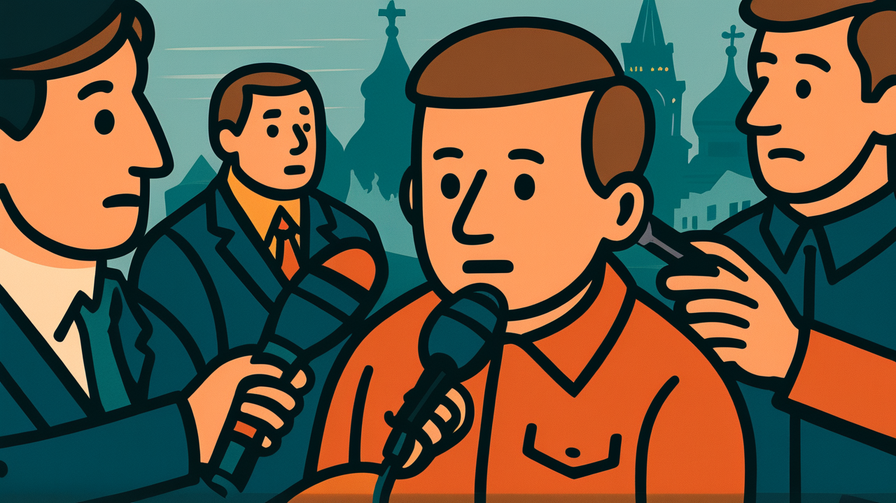[Disclaimer] This article is reconstructed based on information from external sources. Please verify the original source before referring to this content.
News Summary
The following content was published online. A translated summary is presented below. See the source for details.
Russia’s independent media landscape has dramatically shrunk as authorities continue cracking down on outlets that challenge official narratives. The term “Voice” references both the literal silencing of dissenting voices and specific independent media outlets forced to cease operations or relocate abroad. Major independent news organizations have been labeled “foreign agents” or “undesirable organizations,” effectively criminalizing their work. Journalists face arrest, hefty fines, or exile for reporting on sensitive topics. This systematic suppression has created an information vacuum, leaving Russians increasingly dependent on state-controlled media for news about their own country and the world.
Source: Global Voices
Our Commentary
Background and Context

Imagine if your favorite YouTuber, TikToker, or news app suddenly disappeared because the government didn’t like what they were saying. That’s essentially what’s happening in Russia with independent media – news organizations that report facts without government control.
In democratic countries, journalists act as “watchdogs” – they investigate problems, ask tough questions, and keep powerful people accountable. This is called “press freedom,” and it’s considered essential for a healthy society. Russia once had vibrant independent media, but that landscape has changed dramatically.
The crackdown intensified after 2020, with laws that label media outlets as “foreign agents” (implying they’re working for other countries) or “undesirable organizations” (making it illegal to work with them). These labels are like digital scarlet letters – they destroy credibility and make operation nearly impossible.
Expert Analysis
The systematic dismantling of independent media follows a predictable pattern that media freedom experts have documented:
• Legal pressure: New laws make normal journalism activities illegal or risky
• Economic strangulation: Fines, frozen bank accounts, and advertising bans bankrupt outlets
• Physical intimidation: Raids on offices, arrests of journalists, and threats to staff
• Digital blocking: Websites blocked, social media restricted, apps removed from stores
This creates what experts call an “information autocracy” – where the government controls what information citizens can access. Without independent sources, people struggle to verify what’s true, making informed decisions nearly impossible.
Additional Data and Fact Reinforcement
The scale of media suppression in Russia is staggering:
• Over 500 journalists have fled Russia since 2022
• More than 170 media outlets have been labeled “foreign agents”
• At least 40 major independent news organizations have been forced to close or relocate
• Russia now ranks 164th out of 180 countries in the World Press Freedom Index
Major outlets affected include Dozhd (TV Rain), Meduza, Novaya Gazeta, and Echo of Moscow – names that once represented Russia’s media diversity. Many now operate from neighboring countries, trying to reach Russian audiences through VPNs and encrypted messaging apps.
Related News
This media crackdown connects to broader global trends of digital authoritarianism. Similar patterns appear in other countries where governments restrict internet access and control information flow.
Meanwhile, Russian journalists in exile have created innovative ways to reach audiences, including:
• Telegram channels that bypass traditional blocking
• Podcast networks that distribute through multiple platforms
• Collaborative investigations with international media partners
The European Union and United States have provided funding and technical support to help these outlets continue operating from abroad.
Summary

Russia’s loss of independent media represents more than just closed newspapers or blocked websites – it’s the loss of society’s ability to hold power accountable. When citizens can’t access diverse information sources, democracy itself becomes impossible.
For students growing up with social media and instant information access, this situation offers important lessons. Free press isn’t just about reporters doing their jobs; it’s about your right to know what’s happening in your world and make informed decisions about your future.
Understanding media freedom helps us appreciate and protect the information ecosystems we often take for granted. In an interconnected world, what happens to press freedom in one country affects global understanding and cooperation.
Public Reaction
Russian citizens show mixed responses to media restrictions. Younger, urban Russians often use VPNs (Virtual Private Networks) to access blocked content, creating a digital cat-and-mouse game with authorities. However, older generations and rural populations increasingly rely on state television for news.
International journalist organizations have condemned the crackdown. Reporters Without Borders called it “an information black hole” expanding across Russia. Russian journalists in exile report overwhelming support from international colleagues but struggle with the pain of reporting on their homeland from afar.
Frequently Asked Questions
Q: Can Russians still access independent news?
A: Yes, but it requires technical knowledge (using VPNs) and carries legal risks. Many Russians get news through encrypted messaging apps or social media.
Q: Why does press freedom matter if I’m not a journalist?
A: Free press helps you make informed decisions about everything from voting to personal safety. It’s how societies learn about problems and work toward solutions.
Q: What can people outside Russia do to help?
A: Support exiled Russian media outlets, share their reporting, and advocate for press freedom globally. Many outlets accept donations to continue their work.


